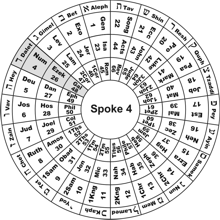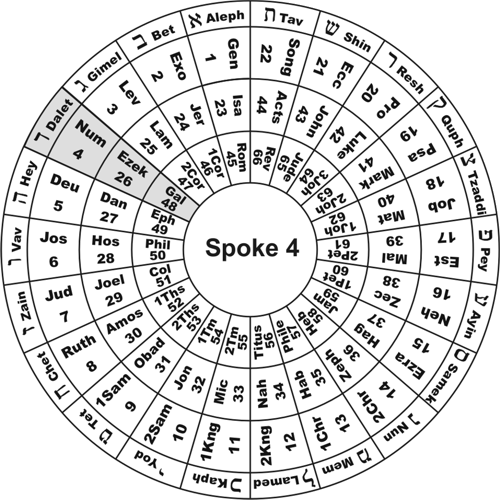Galatians: Four Weak and Beggarly Elements
Now I say, That the heir, as long as he is a child, differeth nothing from
a servant, though he be lord of all; But is under tutors and governors until the time
appointed of the father. Even so we, when we were children, were in bondage under
the elements of the world: But when the fulness of the time was come, God sent forth
his Son, made of a woman, made under the law, To redeem them that were under the law,
that we might receive the adoption of sons.
Galatians 4:1f (Spoke 4, Cycle 3)
 The Rabbis teach that the alphabetic sequence Gimel - Dalet represents
a rich man (Gimel) chasing
a poor man (Dalet) to give him alms. These ideas emerge immediately from words closely
associated with the names of these letters. As discussed at length on Spoke 3,
Gimel represents Gomel, the
Abundant Giver, and
Dalet represents the Dal, the poor. It is particularly significant that when
Dal is used in constructed phrases such as The Rabbis teach that the alphabetic sequence Gimel - Dalet represents
a rich man (Gimel) chasing
a poor man (Dalet) to give him alms. These ideas emerge immediately from words closely
associated with the names of these letters. As discussed at length on Spoke 3,
Gimel represents Gomel, the
Abundant Giver, and
Dalet represents the Dal, the poor. It is particularly significant that when
Dal is used in constructed phrases such as
 (Delet Ha'Aretz,
the poor of the earth, c.f. Jer 40.7),
a Tav is appended to form the construct state, making the word appear identical to Dalet. (Delet Ha'Aretz,
the poor of the earth, c.f. Jer 40.7),
a Tav is appended to form the construct state, making the word appear identical to Dalet.
The root  (dalal) means to hang down,
to be pendulous, to swing.
The idea is passivity, like the leaf of a door hanging on its hinges. Hence
this verse from Proverbs 26.14: "As the door turneth upon his hinges, so doth the slothful
upon his bed." It is the root of the name Delilah who enfeebled Samson (see The Door to the Way of God). (dalal) means to hang down,
to be pendulous, to swing.
The idea is passivity, like the leaf of a door hanging on its hinges. Hence
this verse from Proverbs 26.14: "As the door turneth upon his hinges, so doth the slothful
upon his bed." It is the root of the name Delilah who enfeebled Samson (see The Door to the Way of God).
With this understanding of Dalet, we see the profound significance of the rhetorical question
posed in Galatians 4.8:"
Howbeit then, when ye knew not God, ye did service unto them which by nature
are no gods. But now, after that ye have known God, or rather are known of God,
how turn
ye again to the weak and beggarly elements, whereunto ye desire again to be in bondage?
Note that this verse calls the elements both weak and beggarly. Both of these ideas are strongly
associated with the Fourth Letter. We have an exact match between the symbolic meaning of
Dalet - as understood by the Rabbis and
encoded in the Hebrew language - and the content of Galatians on Spoke 4.
These weak and beggarly elements are called the "stoichia" in Greek. As stated by James Strong
they refer to "the elements
from which all things have come, the material causes of the universe."
Traditionally, they have been four in number - earth, air, water, fire. They are
weak and beggarly because they have no power in themselves. They are utterly
subject to the Will of God and His redeemed people, who once were
"in bondage under the elements of the world (Galatians 4.3).
Immediately following this question, God links these four elements to the Fourth Day
of Creation, saying "ye observe days, and months,
and times, and years." This echoes the fourfold purpose of the Sun, Moon,
and Stars which was defined on the Fourth Day as being "for signs, and for
seasons, and for days, and years." Here is a table with "times" and "days"
from Galatians interchanged to make the correlation more clear:
| Parallel between Galatians and the Fourth Day |
| |
1 |
2 |
3 |
4 |
| Fourth Day |
signs |
seasons |
days |
years |
| Galatians 4.10 |
times |
months |
days |
years |
There are four time related elements in both cases.
The passage continues, refering directly to the Spoke 4 theme of Birth, with Paul declaring that
he is "afraid of you, lest I have
bestowed upon you labour in vain." And then in verse 19, he makes the association explicit,
saying:
My little children, of whom I travail in birth again until Christ be formed
in you, I desire to be present with you now, and to change my voice; for I stand in doubt of you.
Here is a list of the Key Concepts from Spoke 4 found in this short passage:
- Poor, Weak, beggarly
- Four Elements
- Fourth Day of Creation
- Birth
- Knowledge of God
|



